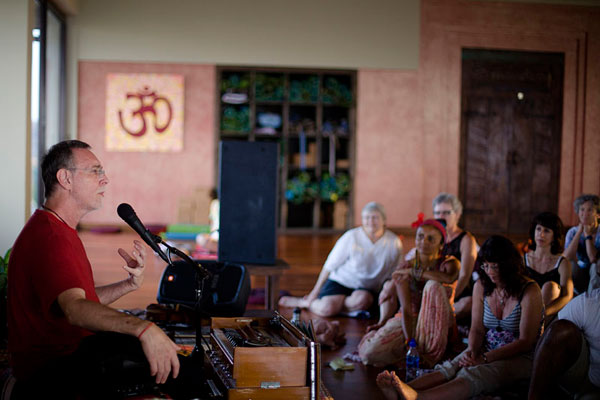
Krishna Das, during his afternoon workshop.
(Feb. 23) A spirited and fully engaged crowd of about 220 people was sprawled around the hardwood floors of the top level yoga studio at Blue Spirit Thursday night. All eyes and ears were on Krishna Das, a man commonly called the "rock star of chanting." Haven't heard of him? Chances are you've at least heard him if you've been to a yoga class in the last five years. He's almost always on the playlist.
KD, as he asked the audience to call him, brought to the stage a sound and an experience that fused the traditions of western music with the spiritual practices of the eastern world. Thursday night's performance, like all his others, was a kirtan -- a call-and-response form of chanting derived from the religions of India.
Imagine a resonant chorus between a couple hundred neighbors, several lively fits of dancing, a few well timed jokes, and some hint of the Stones and you might begin to get a feel for the evening.
The Voice of Nosara caught up with KD the morning after for a cup of tea. He was refreshingly light hearted, and remarkably sincere. Here's what he had to say:
(VON) - Before we get into the music, can you talk a little about your background in Eastern thought? You've studied with some of the great teachers of your time, Ram Das, Maharaji--
(KD) - We didn't study, we hung out -- and ate. We ate a lot of poi and potatoes. (Laughs) Being in India, meeting people who were really involved in the world, with their families and businesses, and who still lived in the spirit all the time. That was amazing. They were plugged in no matter what they were doing, or where they were.
Who were the major inspirations among them? All the great saints. They're in it all the time -- they're plugged in. So any time you hear about them or read about them, it's inspiring. It's inspiring to know that someone's done it. I was very blessed to meet a lot of wonderful, wonderful people. And for me it was really being with Maharaji, hanging out with him on a day to day basis, that changed my life. That is why I am chanting and playing music today.
Last night you talked about chanting as a means of dealing with the anxiety and stress that degrades our everyday lives. Is that what people should come to look for when they attend one of your concerts, or any kirtan?
The lesser the expectations the better. (Laughs) People to come to experience it. They may have heard it's enjoyable or fun to do, but there are so many things that happen when you start chanting. The practice itself is very simple. You start repeating these phrases, call and response, back and forth. As soon as you recognize that you're thinking of something, you let go of that thought and come back to your chanting. That's the whole practice. Nothing is required. You don't have to believe anything, or join anything. It's all about your own individual experience of those moments.
Of letting go?
Yeah, so one of the things you do is you're trying to let go. But you're not even trying to let go. You're just trying to sing and that's how you come to let go. Over the course of time when you're chanting, especially with a large group of people, you begin to cultivate an awareness of your own mind by recognizing when thoughts pop into your head. I'm thinking - come back - I'm thinking - come back. You start to go away less and you begin to sit at home more. You start to have your own personal experience of what it feels like to be at home with yourself. That's what can happen over the course of a kirtan.
In your songs you chant the sanskrit names of different gods or deities -- names that really don't mean anything to some portion of your audience. Is it important which words or names you are chanting? Or is it the resonance of the music, and feeling like you are part of a larger group that creates this effect?
That's a very interesting point. It's not that the words or the names aren't important. It's kind of like you go to a rock concert and the music is great and you feel great, and sing for three hours, but afterwards not much has changed. So in this case, the music is like a syrup, and the medicine is the name - it's hidden in the syrup. The music serves to allow us to enter more deeply into the repetition of the names. And the names bring us to our own true being, that feeling of sitting at home.
What would you say the names represent? Without going too deep into the metaphysics of the Sanskrit language, which I do not know too much about, they represent our true nature. Our true being. Who we are. They are something beyond conceptual language.
Now there's also a rock element to your music, a metered beat and sense of progression within your songs. In that respect, can you talk about some of your early influences?
I grew up with rock 'n roll. Early on in the fifties there were certainly names that you've never heard. Then Ray Charles and Bob Dylan came into view. Folk music and blues were really important to me - I was really into country blues. And then the Beatles, the Stones... later on the Clash, Steely Dan, Van Morrison.
|
|
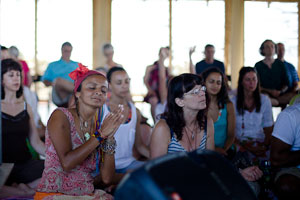
Sejal Patel, (first person from the left) is from India. About the workshop, she said "It's been inspiring, heart opening and transforming." |
| |
|
| |
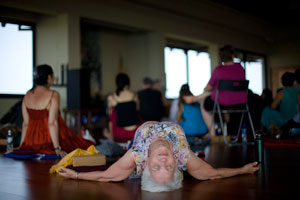
Judith Hand, 70, of New York, also commented that the workshop
was restorative and inspiring for her. She was streching at
the beginning of the workshop. |
| |
|
| |
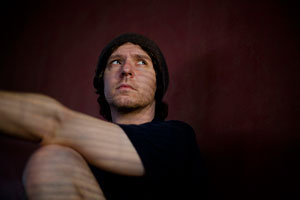
Arjun, Krishna Das' drummer, plays the tabla. |
| |
|
| |

Nina Rao, who also plays cymbals with KD, is his assistant |
| |
|
| |
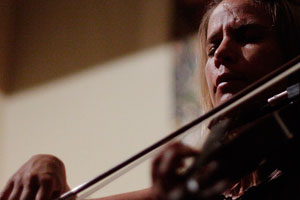
Genevieve Walker, Krishna Das' violinist. |
| |
|
| |
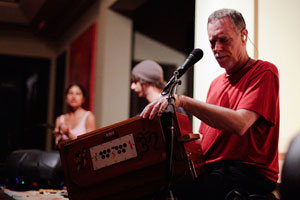
Krishna Das gave one last kirtan before he ended his week long
workshop at Blue Spirit Retreat, in Nosara. |
| |
|
| |
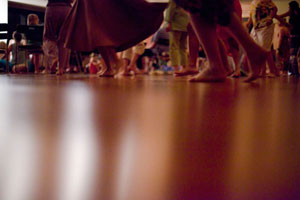
Attendees of the workshop started dancing during the evening
kirtan. |
Who's in the tape deck now?
Ya know... (laughs) I listen to things that I recorded on a little cassette player in the mountains of India thirty years ago. That's what I listen to. (Laughs) Scratchy wierd sounds. (Feigns a choking owl) Actually there is one CD I listen to that I love, called The Lama's Chant. It's beautiful. It's Tibetan chanting, which I really like.
No modern bands really strike your fancy?
I have to admit I'm kind of out of it. It's not that I wouldn't like some of the stuff that's out there. I just find I'm so busy that I don't get to hear a whole lot. Also, when I'm not singing, I would rather just hear nothing. (Laughs) Yeah, that's it. When I'm not singing I like to just chill and kinda let things flow through.
So are you on a tour right now?
Always on a tour. If I'm not coming, I'm probably getting ready to go.
What keeps you going? What's driving you to still be traveling and playing music?
I need to do this. I need to do this for myself. I'm just trying to get through the day, ya know, just like anyone else. This is what keeps me straight. This is what gives me perspective. This is what brings me back every time I get lost. Chanting brings me back. I'm just so fortunate that my life has been arranged this way. I never would have thought I could be so lucky. I'm sharing what I do for myself with other people. All I want is to share what I do, and allow people to participate in the practice, and experience what it is for themselves.
Thanks Krishna. Is that you're streetname by the way?
(Laughs) Call me KD. It's so much easier to say.
|
| |
More Entertainment News
A Symphonic Touch at Playa Carrillo
Classical Music by The Youngest and The First Orchestra of Guanacaste
“We are neither the Berlin Philharmonic Orchestra nor the Vienna Symphony Orchestra. But we are proud to be the first symphonic orchestra of Guanacaste,” said Juan Luis Guevara Mora, the conductor of the 25th of July Symphony Orchestra of Nicoya. More >
Caricaco Music Fest Rocks Harder in its Third Year
Nosara’s own music festival, Caricaco, in its third year at the hilltop retreat Tierra Magnifica, showed that three times is a charm with a strong lineup of bands and professionally managed venue. More >
Saint Patrick day at the Black Sheep pub
An Irish Tradition Celebrated In Nosara
St. Patrick's Day was celebrated on March 17th at Black Sheep Pub with the participation of tens of Nosara residents and visitors. As the tradition requires, the color of the night was green. More >
Art that Illuminates
Local artists were given an opportunity to show their talent amid a festive setting at the Honali Beach House restaurant March 12, with featured artist Sam Schwartz showing his illuminated hand-blown glass orbs that floated mystically in the restaurant pool. More >
Light Shining On Hypnotizing Fingertips
Arjuna an archer in the Mahabharata, a Hindu epic, succeeded in hitting the eye of a wooden fish that was rotating over a reflective pool of oil. He aimed only by looking at the fish's reflection in the pool and in doing so he awed his spectators. This victory won the peerless archer the hand of his first wife, Draupadi. Mas >
The Cymbals Toll For The Gods’ Names
Hemingway addressed the fatuity of war in his book For Whom The Bell Tolls, a title quoted from a sermon of John Donne, an English poet, writer and priest from 16th century. The bells tolled not for one, but for all. We, humans, are all interconnected as he emphasized. More + Slideshow >
Charm of Samara's Desolate Island
Day after day I would look across the ocean toward the little island off Samara beach and wonder what it would be like to be there, until I just had to go check it out myself. More >
Support From the Community For the Community
“If we didn’t have the community’s support, we would have to close the library tomorrow,” Beverly Kitson said during an annual fundraising event for Biblioteca David Kitson. She is the administrative director of the library. More >
Satisfy Your Musical Gluttony
As March, the month of Mars, Roman god of war, is insidiously approaching to conquest 31 days of the year, hunger for good music start to bug the ears. Those of you, who are craving for some locally prepared melodies, got lucky again. Caricaco Music Festival that you already tasted twice in the past years is on its way to Playa Guiones for a third shot. More >
March Astrology Report
Loving Venus moves into Aquarius on the 3rd, reminding us to allow space in our togetherness. Value freedom and independence in your connection, and watch them bloom. Take a moment to appreciate how you fit into your greater community, and how you can help to enrich the world around you. More > |
 |
|
|

